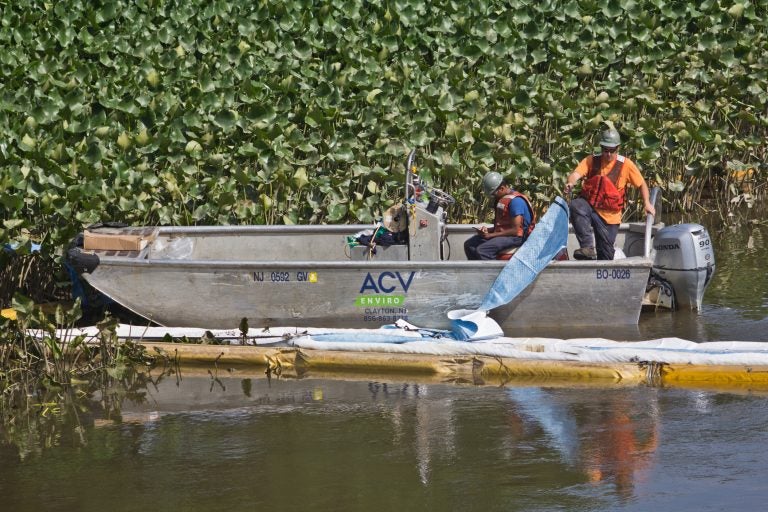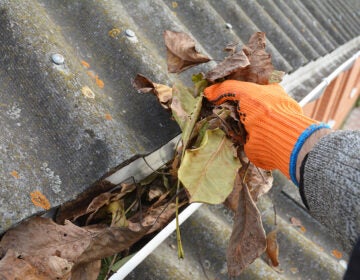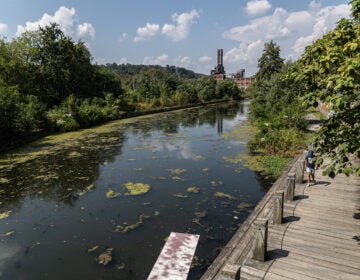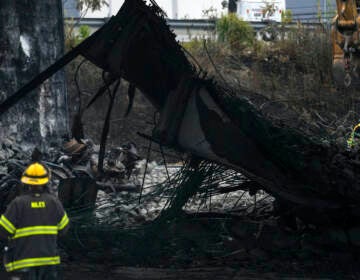ETP says its pipeline leaked into creek near Philadelphia
Officials installed a boom along the north side of the creek to prevent the spread of gasoline after receiving reports of a sheen on the water last week.

An environmental cleanup crew works to remove gasoline fuel from an ETP pipeline spill in Darby creek in Tinicum Township, Pennsylvania, last week. (Kimberly Paynter/WHYY)
Energy Transfer Partners said Tuesday that it is the operator of a pipeline that leaked gasoline into a Delaware County creek last week.
After a weeklong investigation, the parent company of Sunoco Pipeline said the 12-inch diameter pipeline was the source of the spill of an unknown quantity of petroleum product into Darby Creek to the south of Philadelphia International Airport, and about 1,000 feet from the Delaware River.
“We have determined that the source of the petroleum product is our 12-inch refined products line,” said Vicki Granado, a spokeswoman for ETP, in a statement.
She said it would take “some time” to calculate how much product escaped. The leaking section of the pipe will be analyzed by a third party to determine the cause of the incident, and it’s not known how long that part of the investigation will take.
Officials installed a boom along the north side of the creek to prevent the spread of gasoline after receiving reports of a sheen on the water late last Tuesday. Agencies involved included Pennsylvania’s Department of Environmental Protection and the Public Utility Commission; the federal Pipeline and Hazardous Materials Safety Administration and U.S. Coast Guard; and the Delaware County Emergency Management Service.
DEP previously confirmed that the spilled product was gasoline. Its spokesman, Neil Shader, said after Tuesday’s ETP statement that the matter was still under investigation.
Granado said the company is removing the affected section of pipe and will begin to replace it. The new section will then be tested and is expected to be placed into service by the end of this week, she said.
The affected section of pipeline is near train tracks operated by the freight line Conrail but the railroad’s
operation is not being affected, ETP said.
Granado said all the relevant regulatory agencies had been informed of Sunoco’s acknowledgement of the leak. The company’s investigation earlier found that another of its petroleum pipes in the same location, an 8-inch line, was not the source of the spill.
The spill is the latest to affect Sunoco, which has been hit with dozens of drilling-fluid spills during construction of the Mariner East natural gas liquids pipelines, prompting judges or regulators to order three temporary shutdowns. In January, the DEP fined Sunoco $12.6 million for what it said were “egregious” environmental violations during construction of the multibillion-dollar cross-state pipeline which will terminate at Marcus Hook, also in Delaware County.
Del-Chesco United for Pipeline Safety, a citizens group that campaigns for pipeline safety in Delaware and Chester counties, said the spill adds to numerous incidents involving the Mariner East project, which will carry highly volatile natural gas liquids through the two densely populated counties.
“Had this accident involved hazardous, highly volatile liquids, the result could have been a catastrophe,” the group said in a statement. “And, as Delaware County’s Emergency Services Department has acknowledged, it is without even a credible public notification system, much less any plan to protect the public.”
Construction of the Mariner East lines in Chester County’s West Whiteland Township is currently halted for a safety inspection ordered by the PUC.
The latest leak threatened to spread via the creek’s tidal waters to the adjacent John Heinz National Wildlife Refuge, where Sunoco spilled some 190,000 gallons of oil in 2000. The company paid $3.6 million to settle a federal lawsuit following that incident.
WHYY is your source for fact-based, in-depth journalism and information. As a nonprofit organization, we rely on financial support from readers like you. Please give today.




